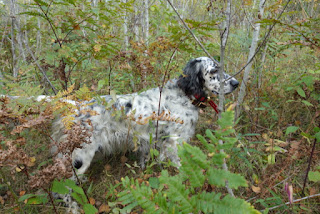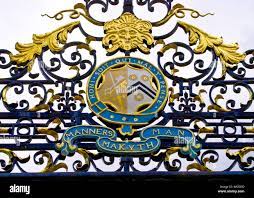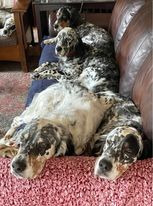Not long ago, I read a wonderful epitaph for a companion gun dog. This dog had had a rather indifferent history, finally landing in a home he could share with a family who understood him, doted on him, got him more time afield than ever in his past lives and, frankly, put him on to the fast track toward Living Happily Ever After.
When the dog passed on, a discerning friend wrote, "He passed away finally loved. That's the most important thing."
Understand that this isn't coming from some fur-baby-besotted twit, but a member of the cognoscenti, a veteran handler who runs a short string of hard-going gun dogs... who share most every aspect of their handler's life.
"The Most Important Thing"... It occurs to me that in the realm of working dogs, particularly our world of sensitive, responsive companion English setters, a higher order "love" for our dogs deserves a thoughtful review.
It should go without saying that we provide the creature comforts - quality food, clean water, dry shelter, regular vet care and grooming. Doing so shows concern. Responsibility. Humanity.
But what about love?
We can admire a dog that cruises the woods with brio. We take pride in a staunch point, a great mark on a downed bird, a tail wagging parade of a retrieve.
But what about love?
Maybe we keep a dog-friendly household arranged around our dogs' comfort and safety.
But what about That Most Important Thing?
The expression "Quality Time" has been reduced to a cliche in our culture. I would suggest that it's not a cliche to our dogs. Beyond their absolute pleasure in their work, created by an upbeat partnership with a savvy, collaborative, clear communicator human, maybe the thing most dogs want (and one of the reasons we invited them fireside, prehistory) is our Quality Time. They relish our focused attention - having their needs respected, being played with, petted, enjoyed as companions supported in ways that make them a pleasure to be with, rather than neurotic, furry crosses to be borne.
A guy named William of Wickham founded Great Britain's New College in Oxford in 1379 (dubbed "New College" to distinguish it from another academy founded fifty years earlier - leave it to the Brits to persist in referencing a 650 year-old school as "new"). The founder gave permission for the school to use his personal coat of arms and motto, "Manners Makyth Man." That idiom remains on the ornate wrought iron entry gate of the school to this day.
Understand that for Wickham, Lord Chancellor to two British monarchs, "manners" related both to personal character as well as etiquette. What could better describe education's role in shaping students' lives? What better backdrop for a loving relationship with our bird dogs?
In that sense, both "character" and "etiquette" are about thoughtfully, routinely, helping our dog with boundaries...which starts with our own decisions regarding, to paraphrase another Englishman, Winston Churchill, "up with what we will or will not put."
Frankly, it's easier to do this one person-on-one-or-however-many dogs with whom we share our lives. If we bring our gun dog into our family setting, all members have to be coached on things like toilet training etiquette, door etiquette, leash etiquette, furniture etiquette, family meal etiquette, counter surfing etiquette, trash can etiquette, bed time etiquette, car etiquette, kid and cat etiquette, barking etiquette, etc., etc.
It becomes a matter of character, of wanting Quality Time with our dogs in the woods and in our homes enough to be clear, consistent, firm and fair, looking at it from the dog's perspective in order to establish order that suits our own. Consistently managed, house manners can be the linch pin of our field connection with our dogs as well. Makes sense, right?
It's only natural that we bird dog people spend a lot of time thinking about performance. The too-often-unspoken bottom line is that that dogs that adapt to our sense of manners in the field get hunted longer and more often because, quite frankly, they are more pleasure than pain to take into the woods.
Likewise, dogs that get the "house rules" get more house time. More petting time. More talking time. More everything, which means more of us, more of them for us. More Quality Time. Love.
The Apostle Paul, writing to the church in Corinth, could have been talking about molding the manners that makyth men, women, and bird dogs in his famous list of love's most vital components: Patience. Kindness. Trust. Hope. Perseverance. A snail-slow fuse to anger...all ingredients to a more fulfilling relationship with other people, let alone building a better companion bird dog.
As Partner Handlers, what better New Year's assessment than to step back and re-evaluate our relationship with our bird dog? Are we holding up our end of the dog/human partnership? Are we willing to do what needs done in a thoughtful, humane, dog-centered manner to make our lives together informed by, buoyed by, heck, made meaningful by being filled with that Most Important Thing?








And while we teach a dog, they are (if we are paying attention) teaching us about so many things. Love this article. It may be just how dense I am but each time I read it I get more from it.♥️
ReplyDeleteThey are our most patient teachers, aren’t they? Thanks for visiting the Firelight blog!
ReplyDeleteThey are our most patient teachers, aren’t they? Thanks for visiting the Firelight blog!
ReplyDeleteThey are our most patient teachers, aren’t they? Thanks for visiting the Firelight blog!
ReplyDeleteThey are our most patient teachers, aren’t they? Thanks for visiting the Firelight blog!
ReplyDelete